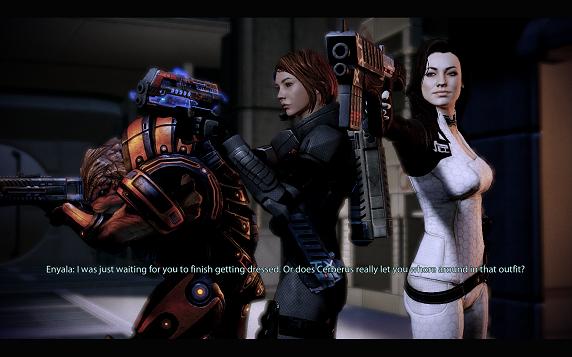
While the original Mass Effect was a great game in my book, I still called it out for the mediocrity of many of the individual components that make up its whole. It represented Bioware’s first attempt to create an RPG that plays like a shooter and their inexperience with the new format showed. Barring a couple of missteps, even if they are pretty big ones, the sequel is a much improved and polished affair, demonstrating just how hard Bioware has worked to address the criticisms leveled against the original game. More importantly however, it further refines the original formula and streamlines it so that it’s much more of a shooter now. That has prompted many gamers to question whether it should even be considered as an RPG any longer.
To answer this, let’s take a look at its disparate elements, beginning with the story. Mass Effect 2 starts shortly after the events of the first game, with the original Normandy being destroyed in a surprise attack by a mysterious alien race known as the Collectors. Presumed dead by both the human Alliance and the Citadel Council, Commander Shepherd is secretly retrieved and essentially resurrected through an expensive two-year process by the pro-humanity paramilitary organization Cerberus. Shepherd is then put to work by the organization’s leader, the Illusive Man, to stop the Collectors who seem to be systematically destroying outlying human colonies one by one on behalf of the Reapers from the original game.
The initial setup is conveyed through a minimally interactive cutscene which is unfortunately unskippable, meaning that you’ll have to sit through the same 10-minute plus scene each time you start a game. As promised, loading a saved game from the first Mass Effect allows you to bring forward your decisions and seeing how they play out in this sequel. This is reflected right from the beginning as who your Shepherd interacts with as the Normandy breaks apart depends on who you chose as your romantic partner in the first game. If you don’t import a saved game, the game makes some default assumptions but this detracts from the richness of the experience.
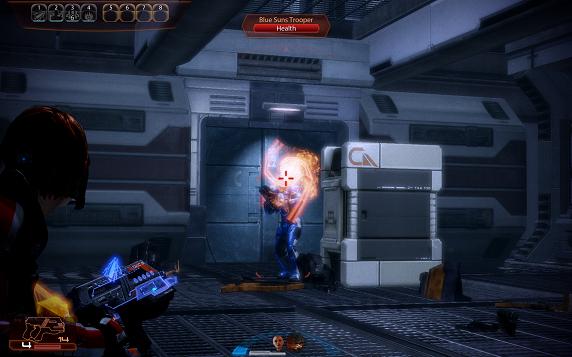
The real gameplay differences can only be seen once the action begins. While the original game had infinite ammunition and only restricted firing rates by making weapons overheat, the sequel requires you to pick up and manage your ammunition more like other shooters. Clips are universal however, so picking one up recharges all of the weapons you’re currently carrying at the same time. I’d say that this change makes the game much more challenging as running out of ammunition is a real possibility in extended fights and encourages you to take your shots more carefully. It also encourages you to use powers as often as possible, something that players often neglected in the first game, as these are only limited by cool down timers. The downside is that the in-game fiction handles the change very clumsily, causing noticeable continuity errors in some parts of the story.
The only big change is that other than ammunition, there is now no inventory to manage. When you pick up an item for a quest for example, it will invisibly stay with you until you use it for its intended quest. You can’t sell it, drop it or otherwise dispose of it. Likewise, your weapon and armor upgrades are now greatly simplified with far fewer different models. Whenever you embark on a mission, you’re taken to a load-out screen to select from the weapons you’ve unlocked, though this is rarely necessary as the weapons you acquire later are almost always superior in every way to the earlier ones. Likewise, you can choose to customize your armor in your cabin aboard the new Normandy but you don’t get any parts to carry around.
The character progression system has been streamlined in the same way. While you still earn experience points from completing missions and gain talent points from gaining levels, the categories into which these points may be allocated have been drastically reduced. To the RPG purists, that means less room for diverse character builds. On the other hand, powers are now more distinct from one another. For example, old biotic staples like Lift and Throw no longer work on enemies who are protected by shields or armor while the tech power Overload damages shields but not armor. This means choosing the right squad members, and hence the right powers, for the type of opposition that you expect to face becomes very important.
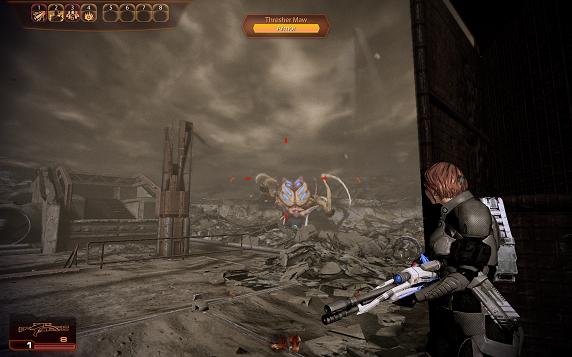
These changes help to make Mass Effect 2 a more credible and overall better action game. Most players considered the first game to be far too easy and it was rarely necessary to maneuver carefully or use clever tactics. This is no longer true for the sequel. Especially on the higher difficulty levels, manually positioning your squad members and making full use of their powers become quite important to prevent them from dying too quickly. In one memorable encounter, you have to fight off waves of zombie-like husks who spawn in many different directions and you need both good marksmanship and good coordination with your squaddies to survive.
One bit of streamlining that I’m none too pleased about is that the environments feel more linear and constricted now. There are fewer side missions to perform and side areas to explore and most levels feel like thinly disguised corridors designed solely to shuffle characters from one combat encounter to another. The good news is that the side missions that do remain are better designed with less of a generic feel, but I missed the fun factor of exploring a huge area like the Citadel in the first game. Good RPGs successfully evoke a sense of place but the levels in Mass Effect 2 are too abbreviated to feel like they belong in a real world.
The biggest missteps that I alluded to earlier are the mini-games. There are two different mini-games for bypassing doors and hacking computers and both are terrible. They’re terribly unimaginative and once you understand how they work, present no challenge whatsoever. The developers might as well have omitted them entirely and allowed the player to automatically succeed at these tasks. There’s also a planet scanning mini-game for finding mineral resources on planets which can be spent to purchase upgrades. While the basic idea for this one is sound, in practice it’s no tedious and repetitive and you find yourself wishing for an auto-scan button. It boggles the mind why Bioware chose to include these mini-games and yet spent so much effort refining and streamlining the rest of the game.
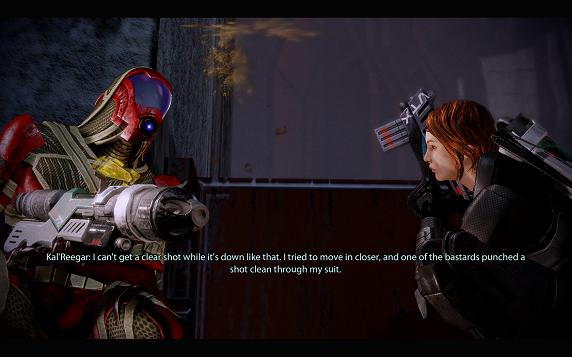
The best part of any Bioware game of course is still the story and I’d say that in this regard Mass Effect 2 ranks up there with the best of them. This game has less of a grand cinematic feel than the original as you spend most of the game recruiting a crack team and earning their loyalty before embarking on a desperate frontal assault on the Collectors. The result is a more intimate, character-focused story with the best bits being easily better than anything in the original. The loyalty mission for one of your squad members, Jacob Taylor, for example, is a shockingly adult scenario right out of The Lord of the Flies. Mordin Solus, another of your squad members, is one of most memorable and interesting characters I’ve seen in any RPG since Planescape Torment. He’s a doctor who doesn’t hesitate to pull out a gun when necessary and his rapid fire manner of speaking marks out as being instantly distinctive and humorous.
Where the writing really shines however is the dialogue and how perfectly the voice actors deliver it and the animators convey it on screen via gestures and facial expressions. The cast list is a veritable who’s who of science fiction, including Tricia Helfer and Michael Hogan from Battlestar Galactica, Adam Baldwin from Firefly, Carrie-Ann Moss from the Matrix films and Michael Dorn from Star Trek: The Next Generation. What strikes me the most is that in almost all RPGs, I make conversational choices based on what I think the outcomes will be. I might be angling for a good reputation for example, or an item as a reward. Here, however, I find that I make choices based on what I personally would say in that situation. It’s a testament to their writing skill and penchant for creating interesting situations that I’d be this immersed in the story.
The original game still has the better finale if only because it has huge explosions and big space battle. It’s hard to be quite as stirring when this game ends with what is effect a guerrilla raid. It also feels a bit odd that you spend more time on the recruitment and loyalty missions rather than the main storyline missions against the Collectors. Finally, I missed the usual Bioware banter between squad members. This is probably another consequence of having so many of them. Many of them have unique dialogue based on the current location or situation, but they almost never speak directly to each other. The nearest thing that you can get is talking about them on board the new Normandy with various crew members.
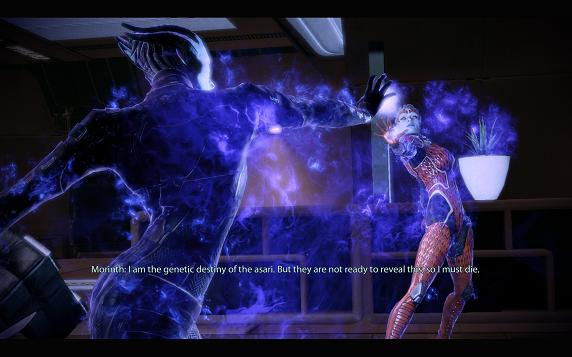
All this is brought to life by a much improved graphics engine. The animation quality doesn’t quite match the best that, say, Ubisoft can manage with the Prince of Persia and Assassin’s Creed games, but it’s miles better than the first one. The vistas are also more varied and in some cases quite spectacular. The biggest shortcoming is that the world still feels too static. Apart from the usual exploding barrels, the player can’t damage or alter the environment in any meaningful way. You’d expect that the powerful weapons and biotic powers at your disposal could blast some serious holes in walls, but you can’t even move so much as a vase out of place. While I don’t expect Crysis-level realism, future Bioware games will have a hard time convincing me that they’re simulating a world if they don’t have some level of destroyable objects and some sort of physics engine.
On balance, I think that Mass Effect 2 is more than worthy successor to the original. While it makes its share of mistakes, it comes off as a mature and polished culmination of the experimental direction taken in the first game. I wouldn’t want all RPGs to take this direction but I do welcome it as a divergent evolutionary path. It took a great deal of courage for Bioware to throw out as much of the traditional RPG baggage as they did, and I for one am keenly interested in the games that this new approach will inspire.
Leave a Reply